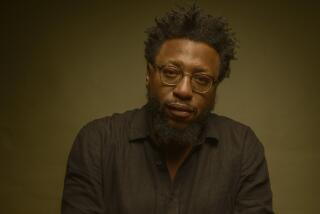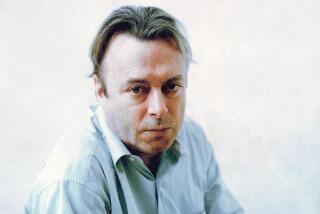An experts’ history of Howard Zinn
- Share via
Howard Zinn died last week. Since 1980, his controversial “A People’s History of the United States” has sold more than 2 million copies, and it has given Zinn -- a professor, social activist, shipyard worker and World War II bombardier -- his own shot at being more than a footnote in the march of time. Marjorie Miller interviewed his colleagues to start history’s assessment.
Sean Wilentz
Princeton University, “The Age of Reagan: A History, 1974-2008”
What he did was take all of the guys in white hats and put them in black hats, and vice versa.
His view was that objectivity was neutrality, which I think is a formula for bad history. Objectivity is not neutrality; it is the deployment of evidence and building an argument based on historical logic. That’s how we engage in rational discourse. To see history as a battleground of warring perspectives is to abandon the seat of reason.
He saw history primarily as a means to motivate people to political action that he found admirable. That’s what he said he did. It’s fine as a form of agitation -- agitprop -- but it’s not particularly good history.
To a point, he helped correct mainstream popular conceptions of American history that were highly biased. But he ceased writing serious history. He had a very simplified view that everyone who was president was always a stinker and every left-winger was always great. That can’t be true. A lot of people on the left spent their lives apologizing for one of the worst mass-murdering regimes of the 20th century, and Abraham Lincoln freed the slaves. You wouldn’t know that from Howard Zinn.
Joseph J. Ellis
Mount Holyoke College, “American Creation: Triumphs and Tragedies at the Founding of the Republic”
If you believe that history is all about irony, paradox and unforeseen consequences, Howard Zinn is not your man. If you believe that history is the eternal struggle between the forces of light and the forces of darkness, and you like to cheer for the underdog, Zinn should be your hero.
Eric Foner
Columbia University, “Forever Free: The Story of Emancipation and Reconstruction”
The idea that historians have to be neutral about everything they study is the death of history. Every historian has beliefs and feelings about what they’re studying. Howard made them very explicit. The teachers you remember are the ones with a passion for history who made it clear what they thought. They were not polemicists. They respected the canons of historical scholarship, as Zinn did, but they cared deeply.
That’s why the whole subject of objectivity is a bit of a misnomer. If objectivity means you balance all of the evidence and weigh it, that’s absolutely correct. If objectivity means you have no opinions of your own, what kind of person is that? Who wants to hear from them?
There are many grounds to criticize many of the things he wrote. I reviewed “A People’s History of the United States” for the New York Times Book Review when it came out in 1980. I gave positive and negative points of view about it, but the point is, this was a passionate interpretation of American history.
The way he inspired people, to me, is his legacy, rather than his interpretation of the Jacksonian era or the Gilded Age or the New Deal. Those can be debated and will be debated. But he deserves more than just people saying this is a biased historian. He really was an important figure in the public vision of history.
Ellen DuBois
UCLA, “Through Women’s Eyes: An American History with Documents,” with Lynn Dumenil
All historians understand that history is selective, imaginative, analytic, interpretive.
Zinn’s role was to make this great body of work by labor historians, African American historians, women historians accessible and engaging for generations of readers.
The political atmosphere and belief in the possibility of citizens making real change in their society is much gloomier now than it was when Zinn first formulated his interpretation of American history. I am very cheered by the continuing interest that young people have year after year in his version of history. They’ve grown up in a world in which they feel citizens can’t really affect the larger political world they live in. That is not the message of his book.
David Kennedy
Stanford University, “Freedom From Fear: The American People in Depression and War, 1929-1945”
I first encountered his work many years ago in a little anthology about the New Deal that appeared in the 1960s and raised the then-heretical question from the left: Was the New Deal really as big a deal as traditional historiography said it was?
“People’s History” is consistent with the position he took on the New Deal, which is that there is this possibility of an alternative history that has been frustrated or thwarted. My view of the New Deal was significantly affected by his and others’ work. I stopped thinking of it as the ultimate achievement of liberal democracy.
His professional persona reminded me of something someone once said about the great British historian A.P.J. Taylor, who was a northerner, and like so many northerners, he was an “aginner.” You said whatever you wanted to say and he was “agin” it. Zinn had some of that temperament. He did not naturally agree with anything. He was a kind of temperamental contrarian. In the great collective enterprise, I think that was a healthy thing.
Doris Kearns Goodwin
Presidential historian, “Team of Rivals: The Political Genius of Abraham Lincoln”
I knew him, and I thought he was an extraordinary person. I met him when I was just starting to teach at Harvard in 1969. It was so exhilarating; he was so passionate about history. I had just come back from working in the White House and then on the ranch with Lyndon Johnson. We had tons of things to talk about.
Even though there has been a lot more movement recently to look at American history from the bottom up, at the time Zinn was writing, he was really forging new ground. Especially during the ‘60s, it all made so much sense.
In these last decades, there is a much greater awareness of the need to see the context of social and historical events, and the way they influence the leaders at the top.
I’m writing about Theodore Roosevelt, and the progressive force of the muckraking journalists will be a big part of what I’m writing about -- Ida Tarbell and Lincoln Steffens and Ray Baker -- because they created the climate of reform that Roosevelt gave voice to.
More to Read
Sign up for Essential California
The most important California stories and recommendations in your inbox every morning.
You may occasionally receive promotional content from the Los Angeles Times.












